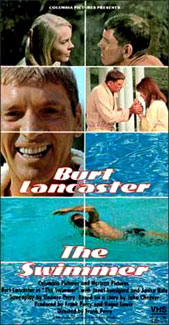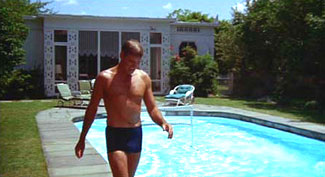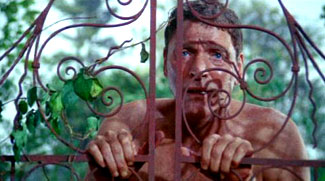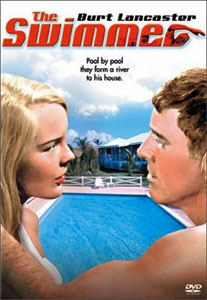 What is almost certainly the best short story John Cheever ever wrote, "The Swimmer," included in his collection The Brigadier & the Golf Widow (1964), mixes his usual suburban or upper-middle class despaire with powerful intimations of the supernatural.
What is almost certainly the best short story John Cheever ever wrote, "The Swimmer," included in his collection The Brigadier & the Golf Widow (1964), mixes his usual suburban or upper-middle class despaire with powerful intimations of the supernatural.
It's about a man who from a knoll sees across a long expanse of a wealthy suburb, noticing every house has its own swimming pool in the back yard. He realizes for the first time that this is a kind of secret "river" by which he might swim home!
 What begins as a summer's afternoon excursion of joy by turns becomes weirder & weirder, as summer seems to be turning into autumn & his neighbors with martinis by their pools address him inexplicably on topics & catastrophes about which he knows nothing. What begins as a summer's afternoon excursion of joy by turns becomes weirder & weirder, as summer seems to be turning into autumn & his neighbors with martinis by their pools address him inexplicably on topics & catastrophes about which he knows nothing.
It ends with his arrival home only to find the place shuttered & empty for a great long while, & himself no longer robust & in his prime, but a worn-out old man who can't get inside.
The reader is left to wonder if he is a madman who blocked tragedies from his memory, or a ghost trying to find his way back into a world that no longer exists for him.
Now when movies adapt a tale as subtle as this one, it would be expected that the adaptation would go overboard. The intimations of supernatural would become ghostly to extreme. But not in Frank Perry's The Swimmer (1968). If anything there are even fewer clues of unreality or of time's speeded-up passage, though it's still sufficient to lend strangeness to the mundane.
 It's the ideal magic realist film infused with ambiguity. It is often said that The Swimmer is an allegory of the failure of the American Dream. It's the ideal magic realist film infused with ambiguity. It is often said that The Swimmer is an allegory of the failure of the American Dream.
But this could be said of most of Cheever's stories of the lives of the privileged class whose successes disguise unhappiness & dysfunction.
The Swimmer is really a much bigger parable than fits into a narrow definition of the American Dream or a criticism of a given class. It's about the entirety of humanity, invested in this one man, or ghost, striving to impose his self-image on a world that increasingly sees him as he really is, not as he dreamed of being.
The adaptation was by Eleanor Perry, the director's wife. She also wrote for her husband the sensitively bizarre David & Lisa (1962) for which she received an Oscar for best adapted screenplay; the anthology film Trilogy (1969) adapting three Truman Capote stories including his great ghost story "Miriam" & for which she received an Emmy; & other great films.
Several of the films of Eleanor & Frank Perry ought to be recognized as American treasures, made cheaply but without interference from producers, & resulting in art. The Perrys were true peers to John Cassavetes & Gena Rowlands.
 Besides the subtlty that preserves the genius of Cheever's original tale, so too The Swimmer upraised by the perfection of the casting of Burt Lancaster as Neddy Merrillm the titular swimmer. Besides the subtlty that preserves the genius of Cheever's original tale, so too The Swimmer upraised by the perfection of the casting of Burt Lancaster as Neddy Merrillm the titular swimmer.
He's the perfect balance of buff hero & crumpled man beyond his prime. We accept his image of himself as eternally youthful (he was 52 at the time) until we see him reflected by the responses of neighbors by their pools, & peering through an iron gate at his own abandoned home.
Lancaster simply slipped into the role with an easy elegance that collapses into final tragedy, fullfilling the vision the Perrys had for this Cheever tale. This is decidedly his greatest of Lancaster's many great performances, even if Birdman of Alcatraz (1962), Atalntic City (1980), & a few others are flashier.
The final image of the swimmer in the sudden storm, weeping & pounding on the impervious door, is one of the most powerful & ghastly moments of emotional (& probably ghostly) horror to be found in all cinema. The brilliant final scene is sometimes credited to Sydney Pollack, who finished the film after Frank Perry left the project over Lancaster's hissy-fit of being upstaged at the final pool by Barbara Loden who played his family's past babysitter.
When Perry refused to reshoot that sequence, Pollack was brought in & it was filmed anew with Janet Landgard, shifting the attention back to the star, who evidently shared a bit of Neddy's misguided ego. But the film had already been completed by Perry & that powerful arrival at Neddy's lost home is not Pollack's doing.
copyright © by Paghat the Ratgirl
|

